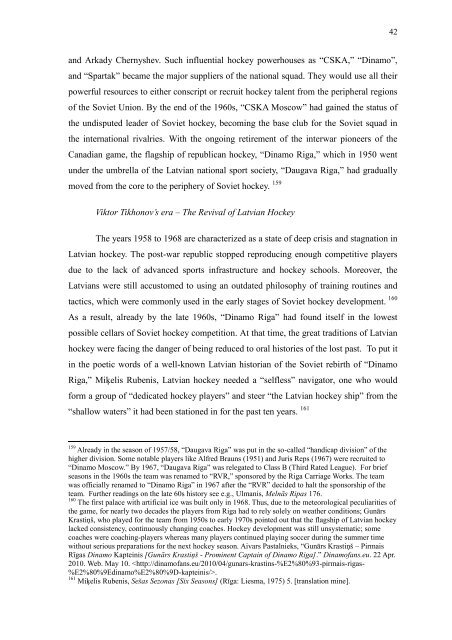University of Turku Faculty of Humanities Baltic Sea Region ... - Doria
University of Turku Faculty of Humanities Baltic Sea Region ... - Doria
University of Turku Faculty of Humanities Baltic Sea Region ... - Doria
You also want an ePaper? Increase the reach of your titles
YUMPU automatically turns print PDFs into web optimized ePapers that Google loves.
42<br />
and Arkady Chernyshev. Such influential hockey powerhouses as “CSKA,” “Dinamo”,<br />
and “Spartak” became the major suppliers <strong>of</strong> the national squad. They would use all their<br />
powerful resources to either conscript or recruit hockey talent from the peripheral regions<br />
<strong>of</strong> the Soviet Union. By the end <strong>of</strong> the 1960s, “CSKA Moscow” had gained the status <strong>of</strong><br />
the undisputed leader <strong>of</strong> Soviet hockey, becoming the base club for the Soviet squad in<br />
the international rivalries. With the ongoing retirement <strong>of</strong> the interwar pioneers <strong>of</strong> the<br />
Canadian game, the flagship <strong>of</strong> republican hockey, “Dinamo Riga,” which in 1950 went<br />
under the umbrella <strong>of</strong> the Latvian national sport society, “Daugava Riga,” had gradually<br />
moved from the core to the periphery <strong>of</strong> Soviet hockey. 159<br />
Viktor Tikhonov’s era – The Revival <strong>of</strong> Latvian Hockey<br />
The years 1958 to 1968 are characterized as a state <strong>of</strong> deep crisis and stagnation in<br />
Latvian hockey. The post-war republic stopped reproducing enough competitive players<br />
due to the lack <strong>of</strong> advanced sports infrastructure and hockey schools. Moreover, the<br />
Latvians were still accustomed to using an outdated philosophy <strong>of</strong> training routines and<br />
tactics, which were commonly used in the early stages <strong>of</strong> Soviet hockey development. 160<br />
As a result, already by the late 1960s, “Dinamo Riga” had found itself in the lowest<br />
possible cellars <strong>of</strong> Soviet hockey competition. At that time, the great traditions <strong>of</strong> Latvian<br />
hockey were facing the danger <strong>of</strong> being reduced to oral histories <strong>of</strong> the lost past. To put it<br />
in the poetic words <strong>of</strong> a well-known Latvian historian <strong>of</strong> the Soviet rebirth <strong>of</strong> “Dinamo<br />
Riga,” Miķelis Rubenis, Latvian hockey needed a “selfless” navigator, one who would<br />
form a group <strong>of</strong> “dedicated hockey players” and steer “the Latvian hockey ship” from the<br />
“shallow waters” it had been stationed in for the past ten years. 161<br />
159 Already in the season <strong>of</strong> 1957/58, “Daugava Riga” was put in the so-called “handicap division” <strong>of</strong> the<br />
higher division. Some notable players like Alfred Brauns (1951) and Juris Reps (1967) were recruited to<br />
“Dinamo Moscow.” By 1967, “Daugava Riga” was relegated to Class B (Third Rated League). For brief<br />
seasons in the 1960s the team was renamed to “RVR,” sponsored by the Riga Carriage Works. The team<br />
was <strong>of</strong>ficially renamed to “Dinamo Riga” in 1967 after the “RVR” decided to halt the sponsorship <strong>of</strong> the<br />
team. Further readings on the late 60s history see e.g., Ulmanis, Melnās Ripas 176.<br />
160 The first palace with artificial ice was built only in 1968. Thus, due to the meteorological peculiarities <strong>of</strong><br />
the game, for nearly two decades the players from Riga had to rely solely on weather conditions; Gunārs<br />
Krastiņš, who played for the team from 1950s to early 1970s pointed out that the flagship <strong>of</strong> Latvian hockey<br />
lacked consistency, continuously changing coaches. Hockey development was still unsystematic; some<br />
coaches were coaching-players whereas many players continued playing soccer during the summer time<br />
without serious preparations for the next hockey season. Aivars Pastalnieks, “Gunārs Krastiņš – Pirmais<br />
Rīgas Dinamo Kapteinis [Gunārs Krastiņš - Prominent Captain <strong>of</strong> Dinamo Riga].” Dinam<strong>of</strong>ans.eu. 22 Apr.<br />
2010. Web. May 10. .<br />
161 Miķelis Rubenis, Sešas Sezonas [Six <strong>Sea</strong>sons] (Rīga: Liesma, 1975) 5. [translation mine].
















